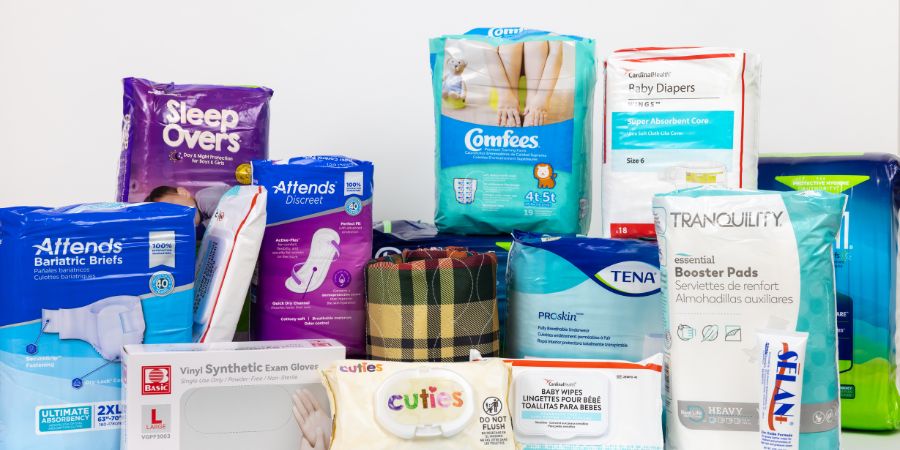Key Takeaways:
- Incontinence is common among children and adults with exceptional needs, and it's essential to help your extended family understand this.
- Honest conversations and advocating for your loved one are key to reducing stigma and creating a supportive environment.
- Extended family members may need to adjust their expectations and caregiving approach to better support a loved one with disabilities and incontinence.
Incontinence can often be distressing and difficult to cope with. Therefore, extended family members will need honesty, practicality, and reassurance from you to be able to reduce stigma, foster understanding, and create a supportive environment for your loved one once they know this information.
Check Your Eligibility
In Under 2 Minutes
Discover the incontinence products available through your insurance.
Jump To:
4 Things to Do Before Talking About Incontinence With Extended Family
How to Talk About Incontinence With Extended Family
10 Things Extended Family Members May Need to Know About Incontinence & Disabilities
How to Get Free Incontinence Products Through Insurance
INCONTINENCE PRODUCTS THROUGH INSURANCE:
Aeroflow Urology is in-network with many Medicaid and Medicaid-managed insurance plans and is accredited by Medicaid. Complete our Eligibility Form, and we’ll automatically check to see if your plan covers incontinence supplies. ***Must meet certain requirements to qualify.***
You will also receive the care and attention every person managing incontinence deserves: A personalized list of 100% insurance-covered incontinence supplies, a dedicated Continence Care Specialist you can contact during business hours, a user-friendly online portal for easy monthly reordering, and educational content.
Get the continence care you need with the dignity you deserve. Join the Aeroflow Urology family today! It only takes 5 minutes to get started.
4 Things to Do Before Having the Discussion With Family
Before having a discussion about your loved one's incontinence, do these 4 things.
- Determine who needs to know. Decide which family members really need to know the details. For example, grandparents who may be involved in caregiving or aunts who may watch over your loved one at a sleepover.
- Find the right environment. You should find a place where you can discuss things privately and calmly. A busy family gathering, for example, would not be the most ideal time.
- Consider whether or not to involve your loved one. It's essential to be sensitive and exclude anyone from talking about your loved one with disabilities or incontinence in front of them (unless they are old enough or want to join in the conversation). Talking about sensitive topics in front of our loved ones when they can understand and hear everything and are excluded is inappropriate conduct. Sometimes people talk over a disabled person, ignore them altogether, or talk only to their caregivers, which can make your loved one feel inadequate.
- Remember, you'll need to advocate. Know that you'll need to advocate cautiously to educate your family members so they refrain from judging your loved one.
How to Talk About Incontinence With Extended Family
Speaking to extended family about your loved one's disability and incontinence condition may seem daunting, but this structure of communication can help.
Begin With Expectations
The conversation has to begin with explaining that societal expectations and universal milestones are not necessarily transferable as expectations that are realistic and achievable for our loved ones, at this point in time.
Speak in a Structured & Consistent Manner
Remain structured and consistent while discussing your loved one's disability and incontinence to benefit your loved one. This also helps to avoid misunderstandings and conflict.
Explain the Diagnosis
Explain your loved one's diagnosis fully and how this affects them. In addition to your loved one's areas of need and challenge, remember to discuss their strengths, abilities, interests, and what is going well! It may also be beneficial to explain that toilet training and incontinence are issues that are naturally occurring for many people living with higher support needs and disabilities.
Discuss Milestones
Like processing things for ourselves, we must tell them the new "facts of life," starting with the reality that typical milestones don't work for our family's daily needs. Your family members need to know that you're not dealing with a linear and predictable situation regarding growth and development, which is perfectly okay.
Avoid Comparisons
It must be clearly stated that issues such as toilet training difficulties and incontinence are ordinary life circumstances, and they can't be compared to a "typical" family member of the same age.
Mention Specific Goals
Communicate specific goals you're working on with your loved one so family members are on the same page.
Talk About Change
Reassure your family members that many things will change and that progress is possible over time in your loved one's own time. However, remember to be honest by mentioning that some things may not change at all.
10 Things Extended Family Members May Need to Know About Incontinence & Disabilities
Apart from having a straightforward discussion with extended family members, you may need to discuss specific differences your loved one faces. Consider mentioning the following things.
Anxiety
Note that feelings of anxiety are extremely common. Remember that the solution is to work together to build a strong sense of trust and more positive, solid connections between your family members and your loved one. Above all else, you can use trust and predictability to counter anxiety, as these things promote feelings of safety.
Fear
Remind your family members that not mastering the toilet and developing a typical path may cause your loved one to have a strong sense of routine, familiarity, and relatability over not using a bathroom


Expectations
Let your family know that the pressure of performance, expectation, measuring up to goals, and not disappointing others, is very real to your loved one.
Transitions & Change
Inform your family that difficulties over transition and change are common for individuals with disabilities and for your loved one. While caring for them, they may need to offer your loved one specific items, such as favorite snacks and drinks, visuals, and other familiar comfort items, such as sensory / fidget toys.
Executive Functioning
Talk with your family about your loved one's challenges with executive functioning (going through multiple steps in an organized way and seeing a task through from start to finish). For example, following various steps in order and promptly.
Interoception
Explain what interoception is to your family members. Interoception deals with the internal body signals that tell your loved one they are hungry, thirsty, hot, sweaty, cold, tired, need to use the washroom, etc. Let your family members know this means that your loved one may lack awareness of being in touch with their internal body sensations, such as the urge to use the bathroom.
Overwhelm
Let your family members know that your loved one's sensory processing differences, such as overstimulation and over-responsiveness, may cause things to occur in the bathroom. For example, the loud noise of the toilet flushing, fear of anticipating the flushing, hypersensitivity over the sound of hand dryers in public washrooms, or a simple dislike over the sensation of water up against your loved one's skin.
Communication
Talk to your family about the communication needs and differences that may pose a challenge when caring for your loved one. They may need to become "detectives" to understand their likes, wants, needs, etc., which will help minimize frustrations, misunderstandings, and possible meltdowns.
Let them know your loved one may also require an alternative way to communicate with them. Effective ways to communicate are not only crucial, but they are also something we are all entitled to as part of a human right.
Progress
Remember to remind your family members that learning new skills is a big deal for your loved one! Progress takes time and may be extremely slow or even invisible initially, so their sense of motivation, reading, and assessing the situation correctly also matter.
Incontinence Products
Incontinence products, such as diapers, adult briefs, protective underwear, pull-ups, and more, are a big part of caring for someone with a disability and type of incontinence, such as urinary or fecal leakage. Let your family know that they may need to assist in helping your loved one use the toilet or apply / change their incontinence products depending on their level of ability to use the bathroom.
When your loved one has a developmental delay and / or is neurodivergent, and also has a disability (invisible or visible), you need to help your extended family members work to shift and reshape their perspectives and feelings on these topics. They may need time to process the changes this will bring to the family, their way of caregiving, and their lives in general.
You must realize that milestones must be customized to best support your loved one's needs and differences. Remind your family that they need to accept that this will look different, and that "different" is not wrong or shameful in any way whatsoever. Different is just different!
Disclaimer
Information provided on the Aeroflow Urology blog is not intended as a substitute for medical advice or care from a healthcare professional. Aeroflow recommends consulting your healthcare provider if you are experiencing medical issues relating to incontinence.












